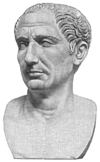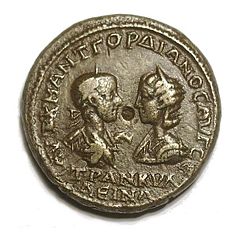Portal:Ancient Rome
2008/9 Schools Wikipedia Selection. Related subjects: Ancient History, Classical History and Mythology; History; Portals
|
Ancient Rome was a civilization that grew from a small agricultural community founded on the Italian Peninsula in the 9th century BC to a large empire straddling the Mediterranean Sea. In its 12 centuries of existence, Roman civilization shifted from a monarchy, to a republic based on a combination of oligarchy and democracy, to an autocratic empire. It came to dominate Western Europe and the area surrounding the Mediterranean Sea through conquest and assimilation. The Roman empire went into decline in the 5th century AD. Plagued by internal instability and attacked by various migrating peoples from beyond its borders, the western part of the empire, including Hispania, Gaul, and Italy, broke up into independent kingdoms in the 5th century. The eastern part of the empire, governed from Constantinople, survived this crisis, and would live on for another millennium, until its last remains were finally annexed by the emerging Ottoman Empire. This eastern, medieval stage of the Empire is usually referred to as the Byzantine Empire by historians. Roman civilization is often grouped into " classical antiquity" with ancient Greece, a civilization that inspired much of the culture of ancient Rome. Ancient Rome contributed greatly to the development of law, war, art, literature, architecture, technology and language in the Western world, and its history continues to have a major influence on the world today.
The Roman Legion (from Latin legio "military levy, conscription", from lego — "to collect") is a term that can apply both as a transliteration of legio ("conscription" or "army") to the entire Roman army and also, more narrowly (and more commonly), to the heavy infantry that was the basic military unit of the ancient Roman army in the period of the late Roman Republic and the Roman Empire. In this latter meaning, it consisted of several cohorts of heavy infantry known as legionaries. It was almost always accompanied by one or more attached units of auxiliaries, who were not Roman citizens and provided cavalry, ranged troops and skirmishers to complement the legion's heavy infantry
The size of a typical legion varied widely throughout the history of ancient Rome, with complements of 4,200 legionaries in the republican period of Rome (split into 35 maniples of 120 legionaries each), to around 5,500 in the imperial period (split into 10 cohorts of 480 men each, with the first cohort at double strength.
Edward Gibbon, English historian, The History of the Decline and Fall of the Roman Empire (1776)
Nero Claudius Caesar Augustus Germanicus ( 15 December 37 – 9 June 68), born Lucius Domitius Ahenobarbus, also called Nero Claudius Caesar Drusus Germanicus, was the fifth and last Roman Emperor of the Julio-Claudian dynasty. Nero was adopted by his grand-uncle Claudius to become heir to the throne. As Nero Claudius Caesar Drusus, he succeeded to the throne on 13 October 54, following Claudius' death.
Nero ruled from 54 CE to 68 CE. During his rule, Nero focused much of his attention on diplomacy, trade, and increasing the cultural capital of the empire. He ordered the building of theatres and promoted athletic games. His reign included a successful war and negotiated peace with the Parthian Empire (58–63), the suppression of the British revolt (60–61) and improving diplomatic ties with Greece.
|




